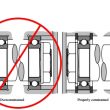Leland Teschler, Executive Editor
[email protected]
On Twitter @DW_LeeTeschler
There are plenty of jokes about people with their head down and their noses buried in their smartphones. But there may be a serious downside, in addition to bumping into walls, when most people have an instant distraction at hand to ward off boredom.
It turns out that a distracted society is an uncreative society. That’s the lesson coming out of  several research groups that have studied the value of unstructured time. In one case, researchers from Penn State found that people who are bored are more likely to let their mind wander in creative ways.
several research groups that have studied the value of unstructured time. In one case, researchers from Penn State found that people who are bored are more likely to let their mind wander in creative ways.
There is also anecdotal evidence that people spend less time musing if recent findings from Netflix are to be believed, The video giant commissioned a study of 1,600 Americans, balanced by age and gender, that found about 37% of them watch TV shows or movies at work. About 12% admit to having done so in a public restroom.
You might think that consuming video content isn’t necessarily a bad thing at least when it comes to engineers. After all, there are a lot of YouTube videos devoted to technical education. (In the spirit of full disclosure, I’ve appeared in a number of these myself.)
But it’s clear that educational videos aren’t what most people answering the Netflix survey spend their time on. About 40% said they had streamed content while riding a bus and about 12% of these admit to being so distracted by what they were watching that they missed their stop. It’s unlikely that videos on the fundamentals of calculus have caused many of these missed stops.
There has been a large body of research on creativity. One common thread in the results is that creative types tend to get ideas during periods of associative thinking—that is, letting the mind meander and just meditating.
There is evidence that time spent musing is time well spent, particularly for technical types. Consider a recent study by three business professors hailing from the University of Toronto and the Massachusetts Institute of Technology. It found a sharp rise in innovative projects posted on a major crowdfunding platform when top engineering schools are on break. The researchers concluded that slack time drives innovation to some degree. “Our evidence suggests that although creators may be able to perform their most important creative work during their spare time while they are at school or work, they are more likely to overcome the friction presented by mundane tasks when they have a solid block of slack time,” the researchers say.
Creativity arising from a little free time can take many forms. That might be the lesson from the antics of environmental engineer Michael Afanasyev. He recently complained to the Dutch Institute for Human rights because the Delft University of Technology would not let him defend his PhD dressed as a pirate.
Afanasyev says he is a priest of the Church of the Flying Spaghetti Monster, a satirical religion that promotes buffoonery of special exemptions for religious beliefs. Pirates are a key part of the Spaghetti Monster religion. Among other things, its adherents have pointed out there is a direct inverse correlation between the number of pirates in the world and rising global temperatures.
Makes you wonder how bored you have to be to come up with a Gospel of the Flying Spaghetti Monster.
You may also like:
Filed Under: Commentaries • insights • Technical thinking









Tell Us What You Think!